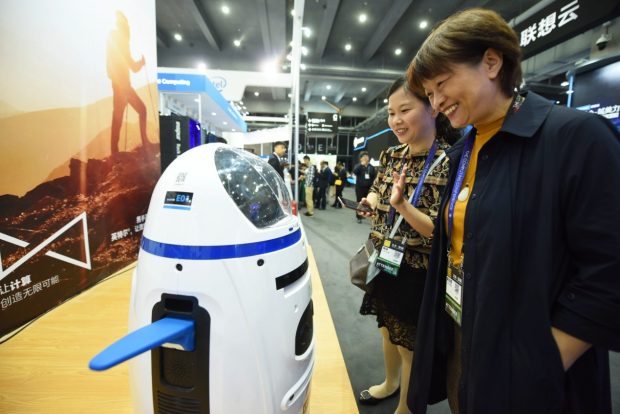China speeds up its pace towards innovation-driven country

Visitors interact with intelligent robots during “The Computing Conference 2017” in Hangzhou, capital of east China’s Zhejiang Province on October 11, 2017. (Photo by People’s Daily Online)
China is hastening its march towards an innovation-driven country, with a recent report placing it 17th out of 40 major countries on the innovation capability index.
The Chinese Academy of Science and Technology for Development (CASTED)’s 2016-2017 national innovation index report shows that China tops the world in terms of filed applications for patents and issued ones, reaching 968,000 and 263,000, respectively.
Science and technology has contributed 56.2% to China’s national development. China’s research and development spending in 2016 reached 1.544 trillion yuan ($236 billion) or 2.1% of the country’s GDP, and companies contributed over 78% of the total.
The total value of technology-related contracts in the year reached 1.14 trillion yuan ($173 billion), exceeding the 1 trillion yuan threshold for the first time.
China has made major advances in science and technology, according to Wang Zhigang, Vice Minister of Science and Technology, citing the 500-meter Aperture Spherical Radio Telescope (FAST) and quantum science experimental satellite “Mozi” as examples.
FAST is the world’s largest single-dish telescope with a diameter of half a kilometer, while Mozi is world’s first quantum communication satellite.
Chinese scientists also found a new type of neutrino oscillation, and were awarded the Breakthrough Prize in Fundamental Physics, Wang said.
He added that the country has also seen progress in manned space, lunar exploration, large passenger jets, the manned submersible Jiaolong, super computers and other big projects.
The public has benefited from the technological advances, Wang said, adding that the shared bikes also adopted advanced technologies, including smart chips, radio frequency identification, location services, electric fences and mobile payments.
As China reforms the management system for science and technology, it has, step by step, built a market-oriented system for technological innovation in which enterprises are the main players and synergy is created through the joint efforts of enterprises, universities, and research institutes.
The procedures to apply for research projects, get funding and report the research have been simplified, and the more flexible proceedings provide a better environment for researchers to explore, said Wang Xiujie, director of the Center of Molecular Systems Biology of the Institute of Genetics and Developmental Biology (IGDB) of the Chinese Academy of Sciences (CAS).
By Liu Junguo from People’s Daily



























































